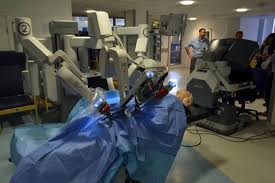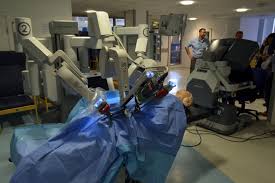
Surgical robots are poised for big gains in operating rooms around the world even though many doctors see need for improvement.
With surgeons sitting at computer consoles guiding mechanical arms, one in three U.S. surgeries is expected to be performed with robotic systems within five years this rate would be more than double current levels. India, China and other emerging markets are also on the radar of companies developing new robots.
Intuitive Surgical Inc, a pioneer in robotic surgery said last week the number of procedures that used them jumped by 16 percent in the second quarter compared to a year earlier. The company has more than 3,600 of its da Vinci machines in hospitals worldwide and has been a dominant force in the market since long.
Deep-pocketed rivals, including Medtronic Inc and a startup backed by Johnson & Johnson and Google are getting attracted to the industry due to the anticipated future growth and the perceived weaknesses of the current generation of robots. company executives and surgeons told Reuters that the aim is to create the next wave of surgical robots that are capable of performing more types of procedures and are more nimble as well as less expensive.
Insurers pay no more for surgeries that utilize the systems than for other types of minimally-invasive procedures, such as laparoscopy although surgical robots run an average of $1.5 million and entail ongoing maintenance expenses.
Despite this investment in this field have been made by most top U.S. hospitals for cancer treatment, urology, gynecology and gastroenterology. New doctors are routinely trained in the use of surgical robots and these have become a prominent feature of hospital marketing campaigns aimed at attracting patients.
According to Intuitive Surgical data, in the United States, hernia repair, bariatric surgery, hysterectomies and the vast majority of prostate removals makes use of surgical robots.
Fatigue is reduced and greater precision is made possible by the use of robots, doctors say.
The number of operations doctors can perform is reduced due to use of robots as robot-assisted surgery can take more of the surgeon's time than traditional procedures. Some like Dr. Helmuth Billy have been turned off by that.
15 years ago, an early adopter of Intuitive's da Vinci system was Billy, reports Reuters. But he was slowed down by equipping its arms with instruments.
"I like to do five operations a day. If I have to constantly dock and undock da Vinci, it becomes cumbersome," Billy said.
Dr. Dmitry Oleynikov, who heads a robotics task force for the Society of American Gastrointestinal and Endoscopic Surgeons said that to gain an edge, new robots will need to outperform laparoscopic surgery.
Better camera image quality and a way to feel the body's tissue remotely, called haptic sensing by robots is what surgeons told Reuters.
Additionally, to convince those with established robotic programs to consider a second vendor or switching suppliers altogether and to entice hospitals and outpatient surgical centers that have not yet invested in a da Vinci, the new systems also will need to be priced low enough.
"That is where competitors can differentiate," said Vik Srinivasan of the Advisory Board Co, a research and consulting firm that advises hospitals.
Attention to these demands is being paid by developers such as Verb Surgical, the J&J-Google venture which said that they are creating a faster and easier-to-use system is a priority and is investing about $250 million in its project.
"As competitors come in, they are going to have to work within that same framework," CEO Gary Guthart said in an interview.
It expects to launch its surgical robot before mid-2018 and will start in India, said Device maker Medtronic. TransEnterix Inc and Canada's Titan Medical Inc. are others that are developing surgical robots.
(Source:www.reuters.com)
With surgeons sitting at computer consoles guiding mechanical arms, one in three U.S. surgeries is expected to be performed with robotic systems within five years this rate would be more than double current levels. India, China and other emerging markets are also on the radar of companies developing new robots.
Intuitive Surgical Inc, a pioneer in robotic surgery said last week the number of procedures that used them jumped by 16 percent in the second quarter compared to a year earlier. The company has more than 3,600 of its da Vinci machines in hospitals worldwide and has been a dominant force in the market since long.
Deep-pocketed rivals, including Medtronic Inc and a startup backed by Johnson & Johnson and Google are getting attracted to the industry due to the anticipated future growth and the perceived weaknesses of the current generation of robots. company executives and surgeons told Reuters that the aim is to create the next wave of surgical robots that are capable of performing more types of procedures and are more nimble as well as less expensive.
Insurers pay no more for surgeries that utilize the systems than for other types of minimally-invasive procedures, such as laparoscopy although surgical robots run an average of $1.5 million and entail ongoing maintenance expenses.
Despite this investment in this field have been made by most top U.S. hospitals for cancer treatment, urology, gynecology and gastroenterology. New doctors are routinely trained in the use of surgical robots and these have become a prominent feature of hospital marketing campaigns aimed at attracting patients.
According to Intuitive Surgical data, in the United States, hernia repair, bariatric surgery, hysterectomies and the vast majority of prostate removals makes use of surgical robots.
Fatigue is reduced and greater precision is made possible by the use of robots, doctors say.
The number of operations doctors can perform is reduced due to use of robots as robot-assisted surgery can take more of the surgeon's time than traditional procedures. Some like Dr. Helmuth Billy have been turned off by that.
15 years ago, an early adopter of Intuitive's da Vinci system was Billy, reports Reuters. But he was slowed down by equipping its arms with instruments.
"I like to do five operations a day. If I have to constantly dock and undock da Vinci, it becomes cumbersome," Billy said.
Dr. Dmitry Oleynikov, who heads a robotics task force for the Society of American Gastrointestinal and Endoscopic Surgeons said that to gain an edge, new robots will need to outperform laparoscopic surgery.
Better camera image quality and a way to feel the body's tissue remotely, called haptic sensing by robots is what surgeons told Reuters.
Additionally, to convince those with established robotic programs to consider a second vendor or switching suppliers altogether and to entice hospitals and outpatient surgical centers that have not yet invested in a da Vinci, the new systems also will need to be priced low enough.
"That is where competitors can differentiate," said Vik Srinivasan of the Advisory Board Co, a research and consulting firm that advises hospitals.
Attention to these demands is being paid by developers such as Verb Surgical, the J&J-Google venture which said that they are creating a faster and easier-to-use system is a priority and is investing about $250 million in its project.
"As competitors come in, they are going to have to work within that same framework," CEO Gary Guthart said in an interview.
It expects to launch its surgical robot before mid-2018 and will start in India, said Device maker Medtronic. TransEnterix Inc and Canada's Titan Medical Inc. are others that are developing surgical robots.
(Source:www.reuters.com)














